Researching Your Social Media Marketing Keywords List
There is a lot more to an effective strategy for social media than simply monitoring and updating your engagement. You also need to meet the needs of your audience, offer them the information they are looking for and answer all of their questions. To be successful, you need to integrate your social marketing into the approach you use for digital marketing. Your strategy should be based on the following criteria.
Understanding Your Audience
Understanding your audience is extremely important. This will show you exactly what you need to post to increase brand recognition and serve your followers better.
FACT: 33% of marketers use paid advertising to increase their brand awareness. (HubSpot)
Know Your Niche
Knowing which topic to cover for your niche enables you to receive optimal exposure for your updates. This will increase your user engagement and provide you with additional leads. You can determine what to publish by conducting research for traditional keywords. Your updates should be phrased to increase your reach.
Tools for Creating a Social Media Keywords List
You should consider using analytics tools to find the best keywords to use on social media. One of your options is Keyhole. This is a good option for performing social keyword research. The data tools work well for both Instagram and Twitter to improve your mention and hashtag results. You will need to have a decent budget to use Keyhole. If you have a tight budget, consider a different option. Here is an example of Keyhole:
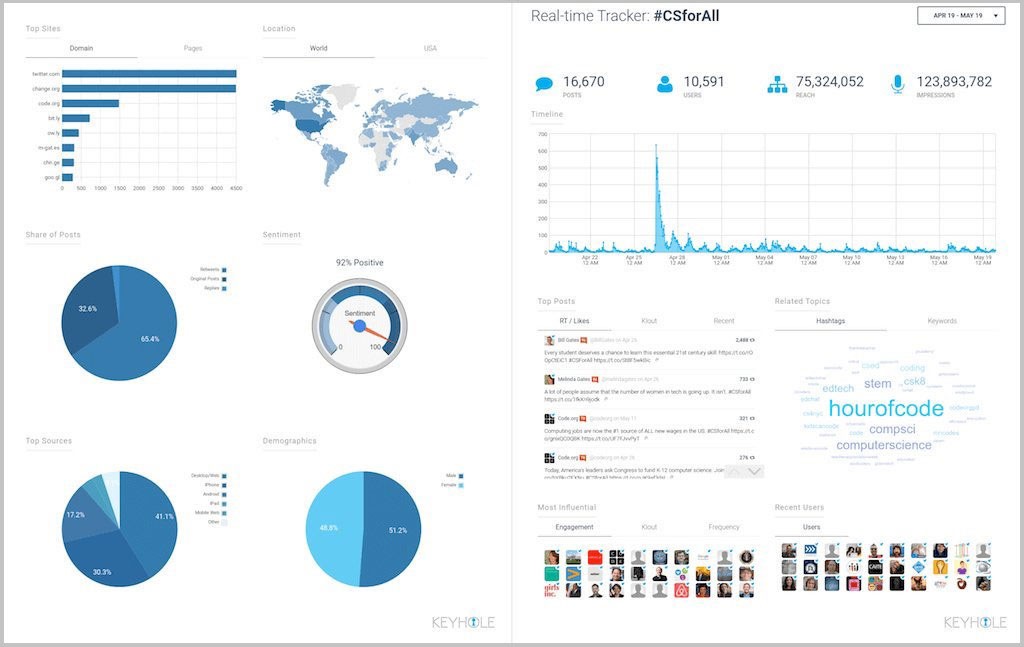
(Image Credit: Influencer Marketing Hub)
Another good option for monitoring your keywords, finding content ideas and examining the strategies of your competitors is BuzzSumo. This tool is ideal to check your keywords based on social shares and your click-through rate. Sometimes keyword phrases are dismissed because of poor performance for searches. The same phrases may perform exceptionally well on social media.
Your success is dependent on numerous factors in addition to CPC and volume. BuzzSumo offers you a wide range of insights in addition to performing well as a question analyzer. This enables you to find the most popular niche questions you can cover in your content. For instance:
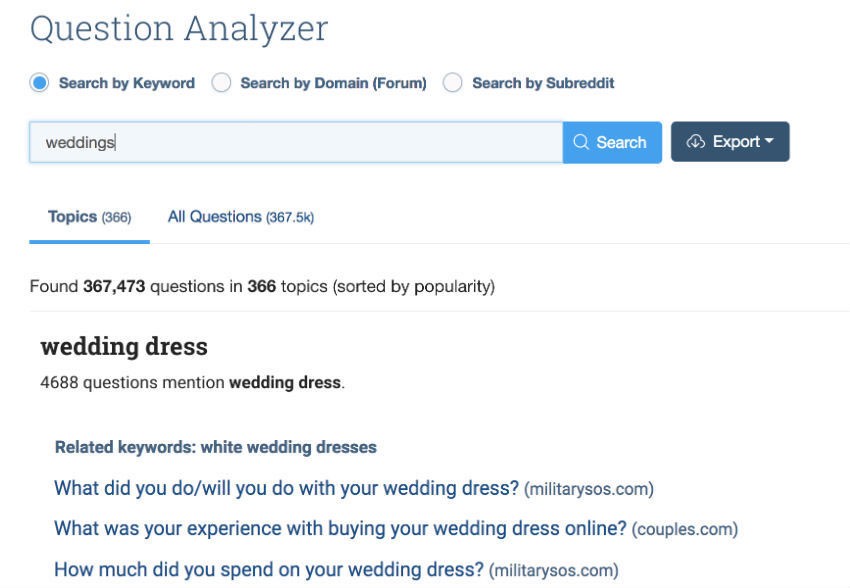
(Image Credit: BuzzSumo)
Native Tools for Social Media Marketing Keywords
A native search is still one of the most effective ways to perform social media keyword research. This involves running a basic search for every platform. The search engines for every major network are different, but all of them filter posts. Conducting individual searches will reveal which keywords are underexploited, oversaturated and popular according to the specific activity of the network.
Just because something is extremely popular on Instagram does not mean it is popular on Twitter. What makes a big splash on Pinterest may not work on Facebook. If you are specific to a certain industry, you do not have to be concerned about running an app to monitor any other industries. This means your starting point is already established. Be aware that native searches are tedious and time consuming.
Despite this, native searches are a thorough, real-time and excellent option to receive insights applicable to your audience that you can effectively act on.
Keywords to Use on Social Media for Facebook
Facebook is currently the biggest social network in the world. This means Facebook is a unique space in the world of social media due to a user base of well over two million users. Facebook provides an extremely engaged audience and exceptional reach as an ideal platform for brands, content producers and pay-per-click advertising. If you want to extend the reach of your marketing plan, Facebook is a great option.
One of the best advantages of Facebook is the sophisticated options available for targeting. You can use an incredibly wide range of criteria for targeting your prospective audience including layered segmentation, a wider range of online interests, patterns of behavior, demographic data or a combination of all available data points.
You Might Also Like
It is not possible to conduct traditional keyword research for Facebook because keyword targeting is not available. There are also no built-in tools for keyword research. Start your keyword research using profile data for the Facebook audience. Your audience is incredibly varied according to hundreds of different parameters such as:
- Life events including getting married or having a baby
- Demographic data (Image Below Facebook Page Insights)
- Specific interests and hobbies
- Wider areas of interest
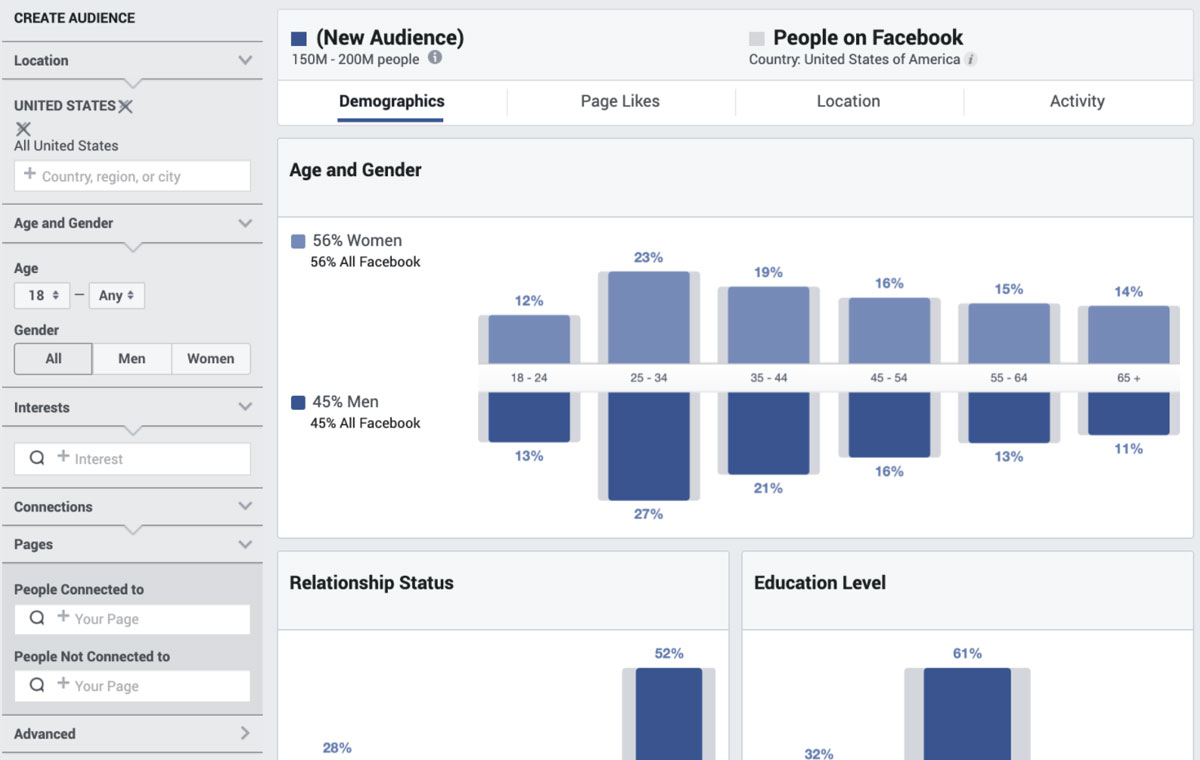
(Image Credit: Jon Loomer Digital)
This means you can use demographic data and interest data points to begin your Facebook keyword research. A good example is if you are selling clothing for toddlers, you can effectively target mothers interested in the latest fashions for infants. This demographic is also interested in other toddler products such as shoes, car seats and toys. Marketing for a wider audience effectively improves your marketing efforts.
There is a very strong connection between keywords with strong commercial intent and interest targeting. The diverse segmentation of the Facebook audience offers you a good option to begin your keyword research for Facebook whether you are a content marketer, optimization specialist or advertiser.
Test your website’s SEO and social media score in 60 seconds!
Diib is one of the best SEO and social media monitoring tools in the world. Diib syncs to Facebook and Google Analytics and uses the power of big data to help you quickly and easily increase your social media traffic and SEO rankings.
- Easy-to-use automated social media + SEO tool
- Keyword and backlink monitoring + ideas
- Speed, security, + Core Vitals tracking
- Automated ideas to improve Social Media traffic + sales
- Over 500,000 global members
- Built-in benchmarking and competitor analysis
Used by over 500k companies and organizations:
Syncs with 
Researching Social Keywords for Twitter
Twitter has become extremely popular for nearly every niche group imaginable including journalists and digital marketers. Twitter offers you a sensational option for an incredible reach and real-time engagement for live events and breaking news. Even if you are an experienced digital marketer, you may find the consistently updating feeds and phenomenal volume of Twitter extremely challenging.
During the past few years, internal search algorithms have been refined. This means finding relevant content on Twitter is a lot easier. In the past, hashtags were vital for the platform. This was one of the few available methods for tracking conversations occurring in real-time. Even though hashtags are still being used, Twitter now offers extremely accurate search functionality.
Whether or not the users are using dedicated hashtags, you can conduct a search for the keyword phrase or keyword of your choice. This is an excellent option to identify which topics are trending on Twitter. During the past few years, internal search functionality has greatly improved. There are also other methods you can use for conducting your keyword research.
You can receive invaluable insights from the analytics platform available through Twitter. You can then leverage your keyword data to increase both engagement and reach. The strength of the data is the diverse audience you can reach using this tool. You can directly search Twitter for specific phrases, hashtags and keywords. You can find exact matches when searching for specific keywords by using quotation marks. For example:
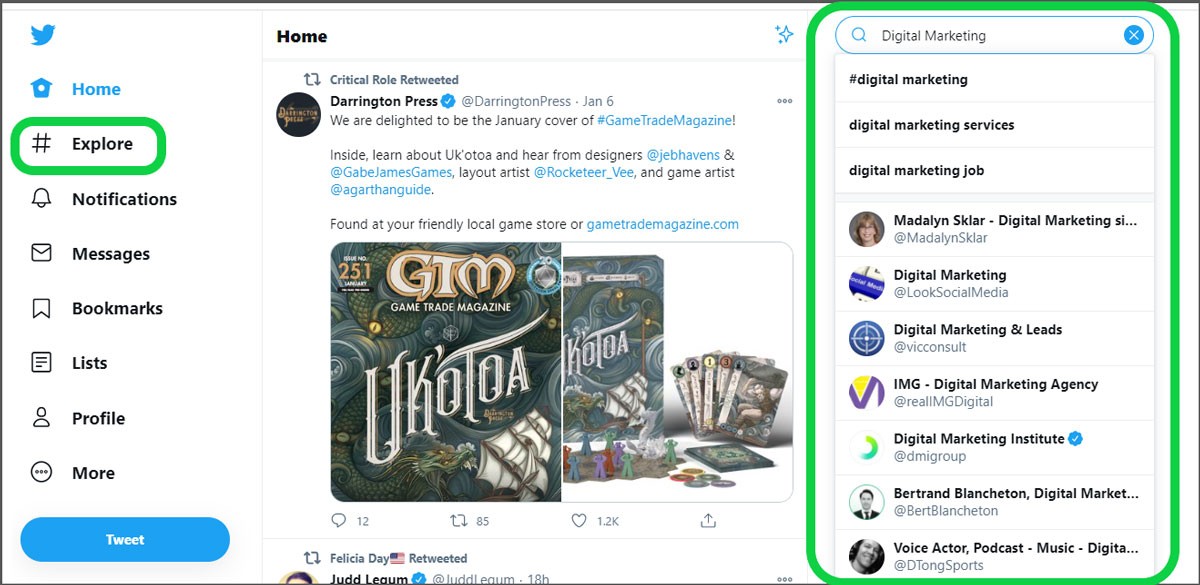
This type of search modifier is also effective for exact-match terms and the specific feeds of the users. Twitter searches for all tweets containing your keyword or phrase. Just like Facebook, Twitter has not included a tool for conducting your keyword research. This means you will require a third-party tool before you can start your keyword research.
Social Media Marketing Keywords for Instagram
You may not be aware Facebook owns Instagram. Although there are some similarities between the two, Instagram is very different from Facebook. Since Instagram is essentially a visual service, some marketers have mistakenly assumed keyword research does not have a lot of value. This is not true because Instagram is still reliant on hashtags for content discovery.
In addition to the extremely attractive visuals, the best performing posts on Instagram all contain a lot of hashtags. This means users can find relevant content for their interests. Even though Instagram is more reliant on hashtags than other social media platforms, you can discover content using keywords. You will need to use hashtags for your initial research because no dedicated research tool is available. For example:
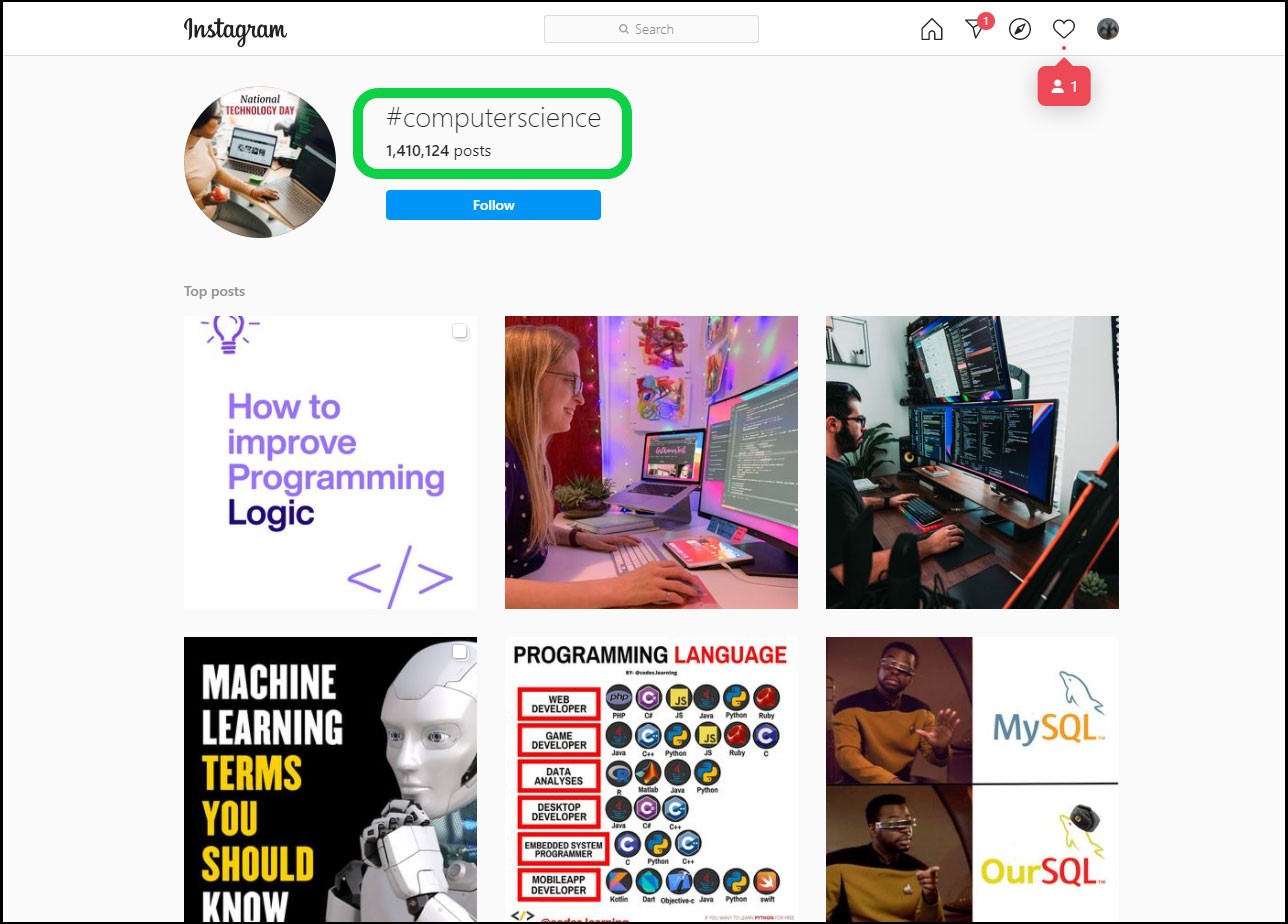
The current practices for optimizing the content on Instagram enable the use of numerous hashtags in every post. Although this is possible, the majority of social media platforms do not agree with this concept. You do not need to obtain tools for keyword research through third-parties for Instagram. They are recommended for organizing and categorizing your keyword data content.
If you intend to run a broad campaign, you should consider using a tool for keyword research in addition to the internal search function provided by Instagram to make certain your campaign is both well structured and organized.
Social Media Keywords Research for YouTube
YouTube is much more than a platform for hosting videos. Every minute an excess of 300 video hours is uploaded to YouTube with more than five billion views posted daily. This makes YouTube the online video king. Keyword optimization and research are critical for expanding your online audience due to the massive amount of video content uploaded and produced on a daily basis.
To optimize your content for YouTube, you must consider content discovery. Make certain you are conducting extremely comprehensive keyword research if you are competing in a competitive or crowded vertical to help ensure your success. There are a lot of tools for keyword suggestions specifically created for this platform by third-parties. The correct tool is entirely dependent on your specific needs.
You also have the option of working with the internal functions offered by YouTube. At first glance, these functions appear difficult, but they are much simpler than they appear. Since YouTube is owned by Google, a lot of the technology inherent to Google has been incorporated such as the search functionality. You can effectively use wildcard searches for targeting your ads or video content.
This can be accomplished by entering a portion of your search term with an underscore character as opposed to a missing word. You will receive suggestions from YouTube similar to the autocomplete search function for Google. The result is an excellent source of ideas for your keywords. You can also start by entering your keyword and allowing Google to use relevant keywords and topics for filling in the blanks.
If you have advertisements running on YouTube, there are additional tools you can use. The Google tools for conducting a keyword analysis are excellent prior to launching your social media campaign. Google also has a keyword planner included in the AdWords interface. You can use it as an effective place to begin identifying the most relevant keywords for the next time you plan a campaign on YouTube. This will enable you to locate additional keyword data. For instance:
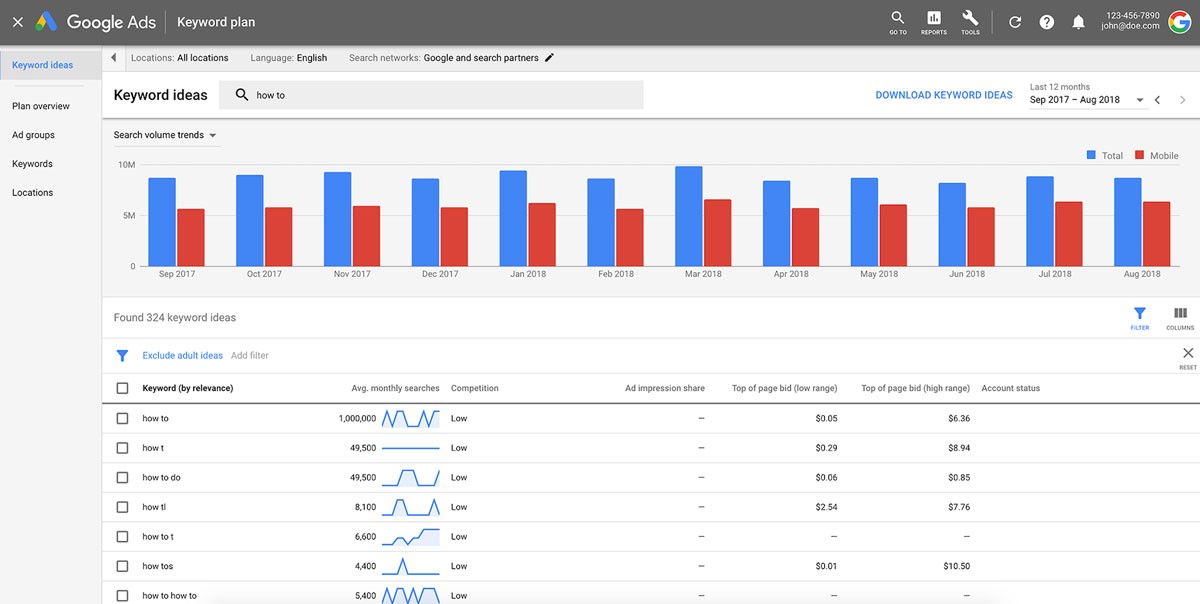
(Image Credit: Keyword Tool)
Keywords to Use on Social Media for Pinterest
Pinterest is considered the most unique platform for social media. Pinterest is essentially a digital pinboard. The platform is completely reliant on content curated by the users as opposed to user-generated. Despite the importance of this distinction, the keywords you choose for Pinterest are critical for the optimization of your content discovery.
Optimizing your content for this platform can be difficult because most of the Instagram content is user-curated. This means there are limits to the content you can place on Pinterest. You must also follow the terms and conditions of the platform regarding any content considered offensive. You can still accomplish your goal in a few different ways.
Your first option is a lot like the wildcard search autocomplete functionality of Google. You simply use the search feature offered by Pinterest as a place to begin. Before your keywords are entered, you will receive a few recent search trends directly from Pinterest. Pinterest also has an explore tab you can use to find potential keywords. The image below shows the autocomplete option:
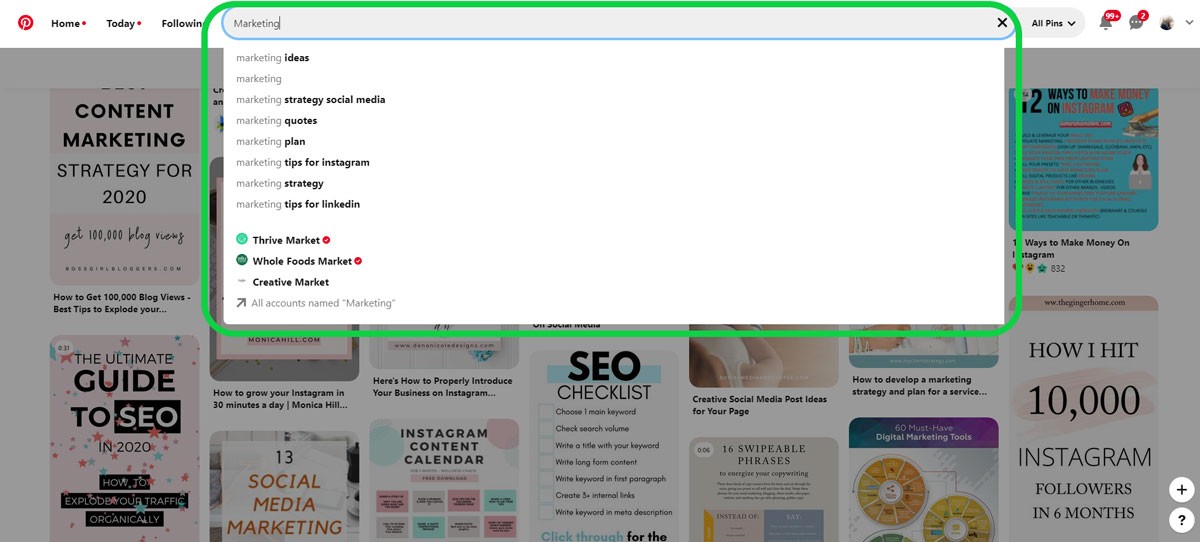
You will receive a variety of suggestions for topics based on your user engagement on Pinterest. You can refine and explore these suggestions to find more ideas for relevant keywords.
We hope that you found this article useful.
If you want to know more interesting about your site health, get personal recommendations and alerts, scan your website by Diib. It only takes 60 seconds.
Popular Social Media Keywords List for 2021
The most popular social media marketing keywords list for 2021 includes:
- Social media marketing
- Social networking sites
- What is social media
- Social marketing
- Social media strategy
- Social media apps
- Social sites
- Social media management
- Social media manager
- Social media analytics
- Social networking apps
- Social media campaign
- Social tools
- Social network
- Social media marketing strategy
- Social network analysis
- Social media platforms
- SNS
- All social media
- Social media news
- Social media
- Social media sites
- Social media agency
- Social media jobs
Tips and Tricks for Social Media Marketing
According to recent statistics, almost 70 percent of all Americans use Facebook. More than 100 million hours are spent every day watching video content. The mobile platform available through YouTube is watched by more people between the ages of 18 and 34 than any cable network in the United States. More than 400 million Snapchats are being sent daily.
These statistics are important because they enable you to plan your social media campaigns according to your targeted demographics. You need to decide what you want to do such as drive more traffic, reach individuals close to your business or increase your conversions. Do not make the mistake of beginning a social media campaign without clear goals, ideas and structure because the result is waste and disorganization.
Determine and use your best ad copy from your search campaigns for social media. There are reasons why this type of strategy is so beneficial. The best way to attract engagement is with excellent ad copy. Engagement is also necessary for improving your quality score. Search and social rankings are similar because both require compelling ads. This results in higher rankings, improved brand visibility and better CTRs.
You can improve your engagement rates, cost per conversion and quality score by narrowing your target audience. You can create consistent messaging for your brand across all social media platforms by ensuring you are using strong search copy for all of your social media ads. Your brand must be consistent to be recognizable and strong. Your paid social media campaigns should be verbally and visually clear.
Make certain your ad messages and images transfer well to your landing pages. Even if your social media ads are attracting a lot of clicks, if the messaging and design of your landing page are completely different your social media ads will not be effective. Your visitors will quickly become lost and disoriented. The result is generally a decreased conversion rate and lost leads.
Landing pages are not essential for your success. A lot of leads are lost when visitors arrive at a landing page. If the majority of your target audience is using mobile devices to watch social media, you can eliminate the need for landing pages with a call now button placed on your advertisements. This ensures the people interested in your services or products can immediately interact with your business.
There are several reasons you should enjoy the benefits of hashtags. Hashtags are one of the most effective and simplest ways to make certain your content is flagged as relevant every time someone searches the subject. This means your target audience will find you. Using hashtags appropriately is also an excellent strategy for building a cross-channel community consisting of your most committed and loyal followers.
Your followers will receive the encouragement they need to promote your brand. The result is your brand visibility increasing throughout social media networks.
Diib®: Find Your Social Media Keywords Today!
Success on social media platforms is within your reach, especially with Diib Digital in your arsenal. We offer both social media analytics and keyword research tools. These will both give you the ability to target just the right demographics and niche that you’re seeking. Here are just a few of the features of our User Dashboard we’re sure you’ll love:
- Social media integration and performance
- Platform specific audience demographics
- Keyword, backlink, and indexing monitoring and tracking tools
- User experience and mobile speed optimization
- Technical SEO monitoring
Call today at 800-303-3510 to speak with one of our Professional Growth Experts or click here for your free 60 second site scan.
FAQ’s
A keyword is just a short phrase that people use when searching the internet for something. Each social media account will require different keywords, it isn’t a “one size fits all” type of approach.
In addition to joining Facebook and LinkedIn groups to understand your target audience. Here are some ways you can get keywords from social media.
- Use Facebook Ad targeting options to see who your target audiences are.
- Delve into trending topics on Twitter.
- Search Instagram hashtags and see what shows up.
One of the easiest ways to see keyword research on Facebook is to simply type in a keyword in the interests section of your Facebook Ad Audience area. This can give you some great suggestions. Or you can browse categories individually.
This is simple. Click on the main menu in the top left in your Facebook Ads manager. Then under the “plan” column, choose “audience insights”.
- #photooftheday.
- #instagood.
- #nofilter.
- #tbt.
- #igers.
- #picoftheday.
- #love.
- #nature.



